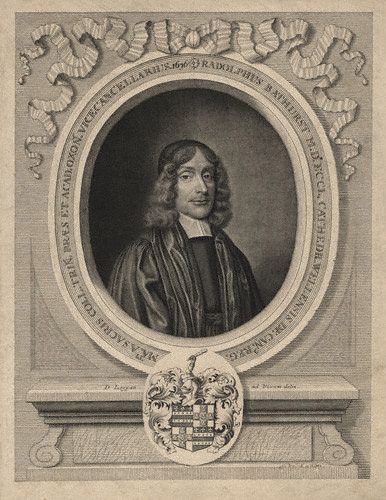Ralph Bathurst
Ralph Bathurst, FRS (1620 – 14 June 1704) was an English theologian, physician, and academic who made significant contributions to the fields of theology, medicine, and science during the 17th century. His life and work intersected with some of the most pivotal moments in English history, including the English Civil War, the Restoration of the Monarchy, and the early years of the Enlightenment.
Early Life and Education[edit | edit source]
Ralph Bathurst was born in 1620 in Hothorpe, Northamptonshire, to a family with strong royalist sympathies. He was educated at the King's School in Worcester and later went on to attend Trinity College, Oxford, where he was elected a fellow in 1640. His studies were interrupted by the outbreak of the English Civil War, during which he served as a royalist, but he returned to Oxford after the war to complete his studies.
Career[edit | edit source]
Bathurst's career spanned several disciplines, reflecting the polymathic nature of scholarly work during his time. He was deeply involved in the intellectual life of Oxford, contributing to the fields of theology, medicine, and natural philosophy.
Theology[edit | edit source]
Initially, Bathurst's work focused on theology. He was ordained as a deacon in the Church of England in 1644 and held various ecclesiastical positions throughout his life. His theological works, however, are less remembered today than his contributions to other fields.
Medicine[edit | edit source]
Bathurst later turned to the study of medicine, a field in which he made significant contributions. He was admitted to the degree of Doctor of Medicine at Oxford in 1660 and became a noted physician, serving as the personal doctor to King Charles II at one point. His medical practice and observations contributed to the early development of clinical medicine in England.
Science and the Royal Society[edit | edit source]
Bathurst was also active in the scientific community of his time. He was elected a Fellow of the Royal Society in 1664, reflecting his active engagement with the scientific advancements of the period. He was a friend and correspondent of notable figures such as Thomas Willis, a founding member of the Royal Society and a pioneer in neurology.
Legacy[edit | edit source]
Ralph Bathurst's legacy is marked by his versatility and contributions to multiple fields of knowledge. His work in medicine and participation in the Royal Society place him among the early figures of the English Enlightenment, contributing to the foundation of modern science and medicine. Despite the breadth of his work, much of his contributions have been overshadowed by his more famous contemporaries.
Death[edit | edit source]
Ralph Bathurst died on 14 June 1704 in Oxford. His contributions to theology, medicine, and science were commemorated by his peers, but his name is less well-known today outside of academic circles.
Search WikiMD
Ad.Tired of being Overweight? Try W8MD's physician weight loss program.
Semaglutide (Ozempic / Wegovy and Tirzepatide (Mounjaro / Zepbound) available.
Advertise on WikiMD
|
WikiMD's Wellness Encyclopedia |
| Let Food Be Thy Medicine Medicine Thy Food - Hippocrates |
Translate this page: - East Asian
中文,
日本,
한국어,
South Asian
हिन्दी,
தமிழ்,
తెలుగు,
Urdu,
ಕನ್ನಡ,
Southeast Asian
Indonesian,
Vietnamese,
Thai,
မြန်မာဘာသာ,
বাংলা
European
español,
Deutsch,
français,
Greek,
português do Brasil,
polski,
română,
русский,
Nederlands,
norsk,
svenska,
suomi,
Italian
Middle Eastern & African
عربى,
Turkish,
Persian,
Hebrew,
Afrikaans,
isiZulu,
Kiswahili,
Other
Bulgarian,
Hungarian,
Czech,
Swedish,
മലയാളം,
मराठी,
ਪੰਜਾਬੀ,
ગુજરાતી,
Portuguese,
Ukrainian
Medical Disclaimer: WikiMD is not a substitute for professional medical advice. The information on WikiMD is provided as an information resource only, may be incorrect, outdated or misleading, and is not to be used or relied on for any diagnostic or treatment purposes. Please consult your health care provider before making any healthcare decisions or for guidance about a specific medical condition. WikiMD expressly disclaims responsibility, and shall have no liability, for any damages, loss, injury, or liability whatsoever suffered as a result of your reliance on the information contained in this site. By visiting this site you agree to the foregoing terms and conditions, which may from time to time be changed or supplemented by WikiMD. If you do not agree to the foregoing terms and conditions, you should not enter or use this site. See full disclaimer.
Credits:Most images are courtesy of Wikimedia commons, and templates, categories Wikipedia, licensed under CC BY SA or similar.
Contributors: Prab R. Tumpati, MD


